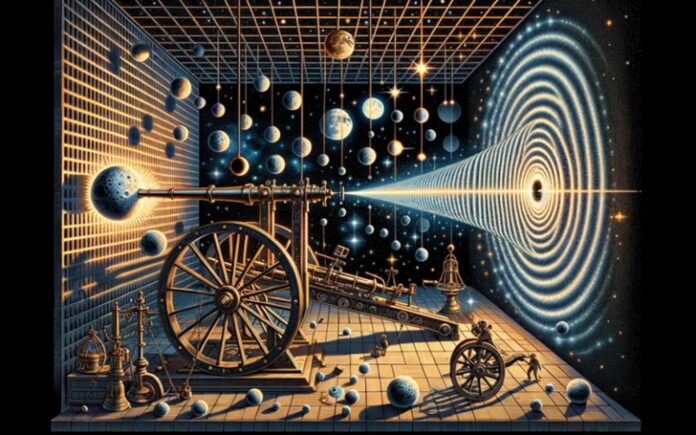Quantum and Einstein’s general relativity theory are two pillars of modern physics. However, these two theories contradict each other, and a reconciliation has remained elusive for over a century.
It has long been believed that for Einstein’s theory of gravity to make sense within the framework of quantum theory, it must be “quantized.” This is the methodology of two prominent contenders for a quantum theory of gravity: loop quantum gravity and string theory.
However, a recent proposal by Professor Jonathan Oppenheim of UCL Physics & Astronomy questions this consensus. It adopts a different tack by speculating that spacetime might be classical, meaning it might not even be governed by quantum theory.
Dubbed a “postquantum theory of classical gravity,” the theory modifies quantum theory and predicts an innate breakdown in predictability mediated via spacetime rather than changing spacetime. Suppose an object’s apparent weight is measured accurately enough. In that case, this leads to larger-than-expected random and violent fluctuations in spacetime, which are not consistent with the predictions of quantum theory.
A second study, undertaken by former PhD students of Professor Oppenheim, examines some of the implications of the theory and suggests an experiment that involves accurately measuring a mass to see if its weight appears to change over time.
For instance, a 1 kg mass- formerly the 1 kg standard- is regularly weighed by the International Bureau of Weights and Measures in France. The idea can be ruled out if the variations in measurements of this 1 kg mass are less than what is necessary for mathematical consistency.
Professor Oppenheim and Professor Carlo Rovelli, along with Dr. Geoff Penington, have made a bet about the results of an experiment. This experiment is about figuring out if spacetime is more like quantum or classical theory. The odds for the bet are 5000 to 1.
For the past five years, the UCL research group has been stress-testing the theory and exploring its consequences.
Professor Oppenheim said: “Quantum theory and Einstein’s theory of general relativity are mathematically incompatible with each other, so it’s important to understand how this contradiction is resolved. Should spacetime be quantized, or should we modify quantum theory, or is it something else entirely? Now that we have a consistent fundamental theory in which spacetime is not quantified, it’s anybody’s guess.”
Co-author Zach Weller-Davies, a PhD student at UCL who helped develop the experimental proposal and made vital contributions to the theory itself, said: “This discovery challenges our understanding of the fundamental nature of gravity but also offers avenues to probe its potential quantum nature.
“We have shown that if spacetime doesn’t have a quantum nature, then there must be random fluctuations in the curvature of spacetime which have a particular signature that can be verified experimentally.”
“In both quantum and classical gravity, spacetime must be undergoing violent and random fluctuations all around us, but on a scale which we haven’t yet been able to detect. But if spacetime is classical, the fluctuations have to be larger than a certain scale, and this scale can be determined by another experiment where we test how long we can put a heavy atom in superposition* of being in two different locations.”
Co-authors Dr. Carlo Sparaciari and Dr Barbara Šoda, whose analytical and numerical calculations helped guide the project, expressed hope that these experiments could determine whether pursuing a quantum theory of gravity is the right approach.”
Dr. Šoda (formerly UCL Physics & Astronomy, now at the Perimeter Institute of Theoretical Physics, Canada) said: “Because gravity is made manifest through the bending of space and time, we can think of the question in terms of whether the rate at which time flows has a quantum nature or classical nature.”
“And testing this is almost as simple as testing whether the weight of a mass is constant or appears to fluctuate in a particular way.”
Dr Sparaciari (UCL Physics & Astronomy) said: “While the experimental concept is simple, the weighing of the object needs to be carried out with extreme precision.”
“But what I find exciting is that starting from very general assumptions, we can prove a clear relationship between two measurable quantities – the scale of the spacetime fluctuations and how long objects like atoms or apples can be put in a quantum superposition of two different locations. We can then determine these two quantities experimentally.”
Weller-Davies added: “A delicate interplay must exist if quantum particles such as atoms are able to bend classical spacetime. There must be a fundamental trade-off between the wave nature of atoms and how large the random fluctuations in spacetime need to be.”
Professor Sougato Bose (UCL Physics & Astronomy), who was not involved with the announcement today but was among those to first propose the entanglement experiment, said: “Experiments to test the nature of spacetime will take a large-scale effort, but they’re of huge importance from the perspective of understanding the fundamental laws of nature. I believe these experiments are within reach – these things are difficult to predict, but perhaps we’ll know the answer within the next 20 years.”
Journal References:
- Jonathan Oppenheim. A postquantum theory of classical gravity? Phys. Rev. X. Paper
- Oppenheim, J., Sparaciari, C., Šoda, B. et al. Gravitationally induced decoherence vs spacetime diffusion: testing the quantum nature of gravity. Nat Commun 14, 7910 (2023). DOI: 10.1038/s41467-023-43348-2
